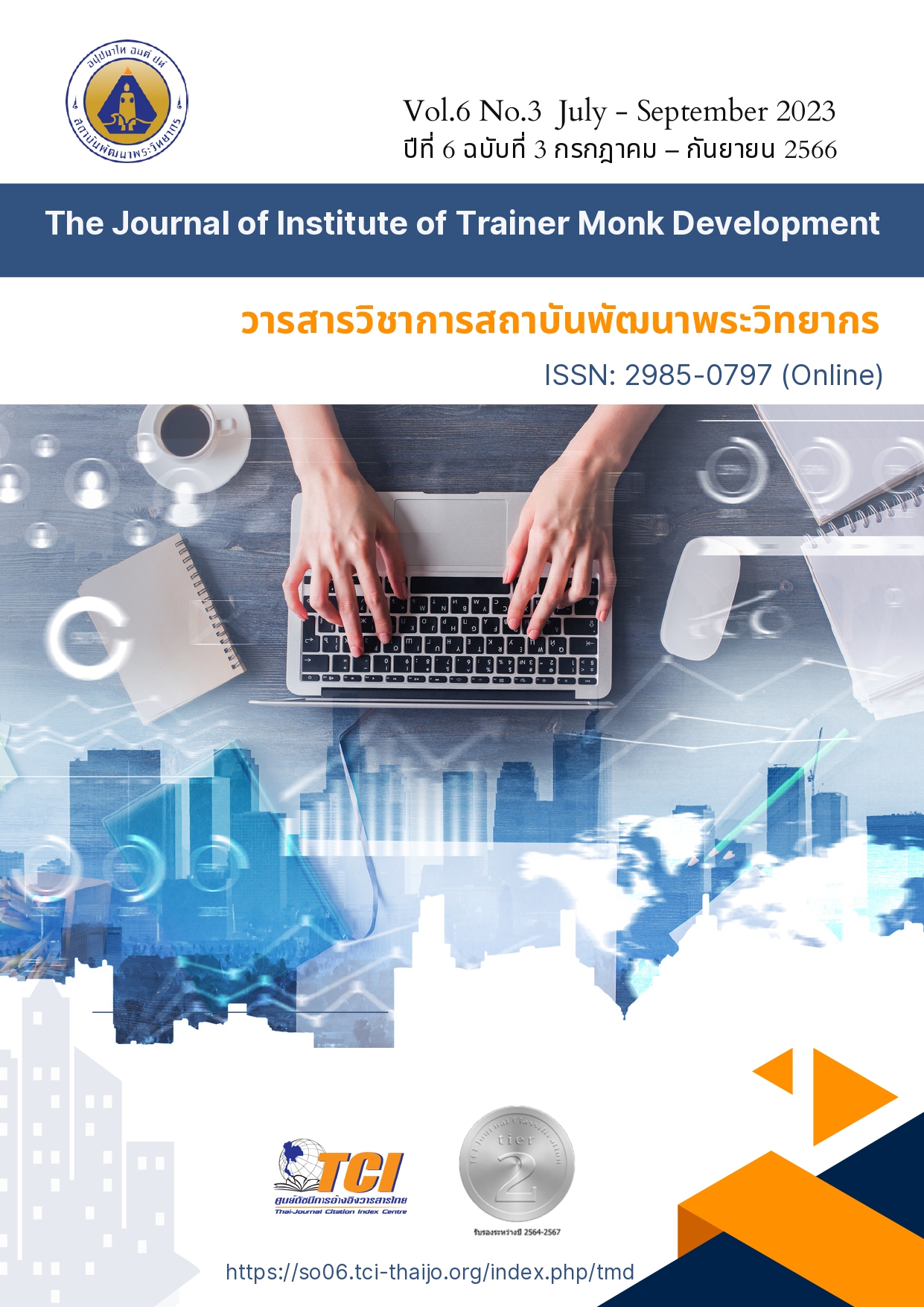Guidelines for Enhancing the Happiness According to Buddhist Psychology of the Elderly During the Covid-19 Situation
Main Article Content
Abstract
Research article on the guidelines for creating happiness for the elderly during the COVID-19 according to Buddhist psychology it is aimed to 1) study the characteristics and components of happiness of the elderly during the COVID-19 crisis, 2) study the guidelines to apply Buddhist Psychology to create happiness in the elderly during the crisis of COVID-19. The research used qualitative research using in-depth interviews. The research selected the key informants specifically. In summary, the key informants consist of two monks, one psychiatrist, one psychologist, and five representatives of the elderly. The qualitative data analysis used content analysis and analytic induction. The results showed that: 1) The characteristics and components of happiness of the elderly during the crisis of COVID-19, the researcher who analyzed the data from the interviews found that the happiness of the elderly during the crisis of COVID-19 characterized by a feeling of comfort and anxiety and having good atmosphere surrounding by family and friends, far from disease and having an opportunity to gain merit upon their belief which can be categorized into four characteristics which are (1) Physical good health means having a state of complete physical health, having a sufficiency of four basic needs, physically strong health, have a simple lifestyle and be able to adapt to the environment and changes, stability, safety, and far away from disease. (2) Happiness means having a complete state of mind in peace and happiness, accepting all changes, having good mental health, and being emotionally stable. (3) Relationship Happiness is to live with others happily (4) Happy with a way of accumulating merit, which means fulfilling life with spiritual growth. For clause number 2 of the study, the guidelines to apply Buddhist Psychology to create happiness in the elderly during the crisis of COVID-19 needs to apply by using the four meditation principles as a guideline; this can create four holistic happiness, namely: 1. care for your health 2. take reasonable care to your heart to be strong 3. maintain the relationship 4. keep gaining merit.
Article Details

This work is licensed under a Creative Commons Attribution-NonCommercial-NoDerivatives 4.0 International License.
บทความที่ได้รับการตีพิมพ์เป็นลิขสิทธิ์ของวารสารวิชาการสถาบันพัฒนาพระวิทยากร
ข้อความที่ปรากฎอยู่ในบทความที่ได้รับการตีพิมพ์ในวารสาร ถือเป็นความรับผิดชอบของผู้เขียนบทความ และข้อคิดเห็นนั้นไม่ถือว่าเป็นทัศนะและความรับผิดชอบของกองบรรณาธิการวารสารวิชาการสถาบันพัฒนาพระวิทยากร
References
ดุษฎี อายุวัฒน์. (2562). “ความสุขในชีวิตของผู้สูงอายุ ภาคตะวันออกเฉียงเหนือ”. วารสารภาษา ศาสนาและวัฒนธรรม, 8(1): 136-155.
ธิดารัตน์ นวลเดช. (2561). “การเปรียบเทียบความสุขของผู้สูงอายุในโรงเรียนผู้สูงอายุกับผู้สูงอายุในชุมชนเขตเทศบาลเมืองหนองปรือ อำเภอบางละมุง จังหวัดชลบุรี”. วารสารด้านการบริหารรัฐกิจและการเมือง, 7(1): 150-174.
พระสมุห์โชคดี วชิรปญฺโญ (ราโชกาญจน์). (2564). “รูปแบบการพัฒนาความสุขของผู้สูงอายุตามแนวพุทธจิตวิทยาในสังคมสมัยใหม่”. วารสารครุศาสตร์ปริทรรศน์ฯ, 8(2): 41-53.
พระสุรัศ สุรปญฺโญ. (2563). “หลักพุทธธรรมเพื่อเสริมสร้างความสุขสำหรับผู้สูงวัยในพระพุทธศาสนา”. วารสารปรัชญาอาศรม, 2(1): 64-65.
มนทิรา จันดาหาร และจิระสุข สุขสวัสดิ์. (2561).“ความสุขจากการพึ่งตนเองในบั้นปลายชีวิตของผู้สูงอายุในชุมชนชนบท อำเภอภูเรือ จังหวัดเลย”. วารสารมนุษยศาสตร์และสังคมศาสตร์บัณฑิตวิทยาลัย มหาวิทยาลัยราชภัฎพิบูลสงคราม, 12(2): 515-530.
มหาจุฬาลงกรณราชวิทยาลัย. (2539). พระไตรปิฎกฉบับภาษาไทย ฉบับมหาจุฬาลงกรณราชวิทยาลัย. กรุงเทพมหานคร: โรงพิมพ์มหาจุฬาลงกรณราชวิทยาลัย.
วรเวศม์ สุวรรณระดา. (2559). ชาญชรา: ก้าวสู่สังคมสูงวัยด้วยความรู้และปัญญา. กรุงเทพมหานคร:ห้างหุ้นส่วนจำกัด ภาพพิมพ์.
วรวุฒิ ชมภูพาน. (2564). “ผลของการเข้าร่วมกิจกรรมกลุ่มต่อความสุขของผู้สูงอายุในชุมชน” วารสารสหวิชการเพื่อสุขภาพ, 3(1): 53-60.
สำนักงานคณะกรรมการพัฒนาการเศรษฐกิจและสังคมแห่งชาติ. (2553). เอกสารประกอบการประชุมทิศทางแผนพัฒนาฯ ฉบับที่ 11. กรุงเทพมหานคร: สำนักงานคณะกรรมการพัฒนาการเศรษฐกิจและสังคมแห่งชาติ.
สุชาดา วงศ์สวาสดิ์. (2563). “ความสุขของผู้สูงอายุในชนบทจังหวัดนครราชสีมา”. วารสารสังคมศาสตร์และมานุษยวิทยาเชิงพุทธ, 5(10): 17-34.
อาจ เมธารักษ์. (2564). “พุทธวิธีการดำเนินชีวิตอย่างมีความสุขของผู้สูงอายุ”. วารสารปรัชญาอาศรม, 3(1): 40-51.
Dalai, Lama & Cutler, H.C. (1998). The Art of Happiness: A Handbook for Living. New York: Riverhead Books.
Gomez, et al. (2009). “The influence of personality and life events on subjective well-being from a life span perspective”. Journal of Research in Personality, vol. 43: 345-354.


